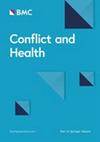Feasibility and acceptability of phone-delivered psychological therapy for refugee children and adolescents in a humanitarian setting
IF 3.1
2区 医学
Q2 PUBLIC, ENVIRONMENTAL & OCCUPATIONAL HEALTH
引用次数: 0
Abstract
Refugee children are at high risk of mental health problems but face barriers to accessing mental health services, a problem exacerbated by a shortage of mental health professionals. Having trained lay counsellors deliver therapy via telephone could overcome these barriers. This is the first study to explore feasibility and acceptability of telephone-delivered therapy with refugee children in a humanitarian setting. An evidence-based intervention, Common Elements Treatment Approach, was adapted for telephone-delivery (t-CETA) and delivered by lay counsellors to Syrian refugee children in informal tented settlements in the Beqaa region of Lebanon. Following delivery of t-CETA, semi-structured interviews were conducted with counsellors (N = 3) and with children who received t-CETA (N = 11, 45% female, age 8–17 years) and their caregivers (N = 11, 100% female, age 29–56 years) (N = 25 interviews). Thematic content analysis was conducted separately for interviews with counsellors and interviews with families and results were synthesized. Three themes emerged from interviews with counsellors and four themes from interviews with families, with substantial overlap between them. Synthesized themes were: counselling over the phone both solves and creates practical and logistical challenges; t-CETA is adapted to potential cultural blocks; the relationship between the counsellor and the child and caregiver is extremely important; the family’s attitude to mental health influences their understanding of and engagement with counselling; and t-CETA works and is needed. Counselling over the phone overcame logistical barriers, such as poor transportation, and cultural barriers, such as stigma associated with attending mental health services. It provided a more flexible and accessible service and resulted in reductions in symptoms for many children. Challenges included access to phones and poor network coverage, finding an appropriate space, and communication challenges over the phone. Despite some challenges, telephone-delivered therapy for children shows promising evidence of feasibility and acceptability in a humanitarian context and has the potential to increase access to mental health services by hard-to-reach populations. Approaches to addressing challenges of telephone-delivered therapy are discussed. Trial Registration ClinicalTrials.gov ID: NCT03887312; registered 22nd March 2019.在人道主义环境下为难民儿童和青少年提供电话心理治疗的可行性和可接受性
难民儿童是心理健康问题的高危人群,但在获得心理健康服务方面却面临障碍,而心理健康专业人员的短缺又加剧了这一问题。让训练有素的非专业辅导员通过电话提供治疗可以克服这些障碍。这是第一项探讨在人道主义环境下为难民儿童提供电话治疗的可行性和可接受性的研究。研究人员对基于证据的干预措施 "共同要素治疗方法 "进行了改编,使其适用于通过电话提供治疗(t-CETA),并由非专业辅导员向黎巴嫩贝卡地区非正式帐篷定居点的叙利亚难民儿童提供治疗。在提供 t-CETA 后,对辅导员(3 人)和接受 t-CETA 的儿童(11 人,45% 为女性,8-17 岁)及其照顾者(11 人,100% 为女性,29-56 岁)(25 人)进行了半结构式访谈。对辅导员访谈和家庭访谈分别进行了主题内容分析,并对结果进行了综合。与辅导员的访谈产生了三个主题,与家庭的访谈产生了四个主题,两者之间有大量重叠。综合后的主题是:电话咨询既解决了实际和后勤方面的挑战,也带来了挑战;t-CETA 可适应潜在的文化障碍;咨询师与儿童和看护人之间的关系极其重要;家庭对心理健康的态度影响了他们对咨询的理解和参与;t-CETA 是有效的,也是需要的。电话咨询克服了交通不便等后勤障碍和文化障碍,如与接受心理健康服务相关的耻辱感。它提供了一种更灵活、更方便的服务,使许多儿童的症状得到缓解。面临的挑战包括电话的接入和网络覆盖差、寻找合适的场所以及电话沟通方面的困难。尽管存在一些挑战,但在人道主义背景下,电话为儿童提供治疗的可行性和可接受性得到了很好的证明,并有可能增加难以接触到的人群获得心理健康服务的机会。本文讨论了应对电话疗法挑战的方法。试验注册 ClinicalTrials.gov ID:NCT03887312;2019年3月22日注册。
本文章由计算机程序翻译,如有差异,请以英文原文为准。
求助全文
约1分钟内获得全文
求助全文
来源期刊

Conflict and Health
Medicine-Public Health, Environmental and Occupational Health
CiteScore
6.10
自引率
5.60%
发文量
57
审稿时长
18 weeks
期刊介绍:
Conflict and Health is a highly-accessed, open access journal providing a global platform to disseminate insightful and impactful studies documenting the public health impacts and responses related to armed conflict, humanitarian crises, and forced migration.
 求助内容:
求助内容: 应助结果提醒方式:
应助结果提醒方式:


